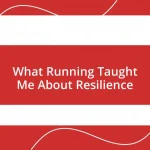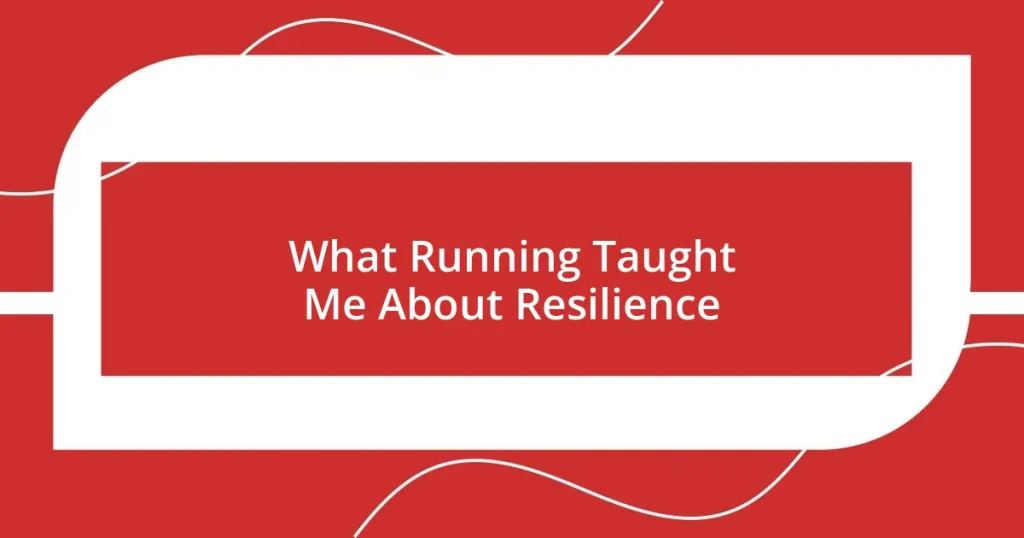Key takeaways:
- Charity fosters connections and understanding, leading to personal growth and community transformation through small acts of kindness.
- Volunteering provides opportunities for skill development, emotional rewards, and builds a sense of purpose by making a difference in people’s lives.
- Success in charity initiatives is measured not only by quantitative metrics but also through community engagement, sustainability, and beneficiary feedback.
- Effective charity organizations prioritize mission alignment, transparency, and demonstrable impact, which build trust and encourage contributions.
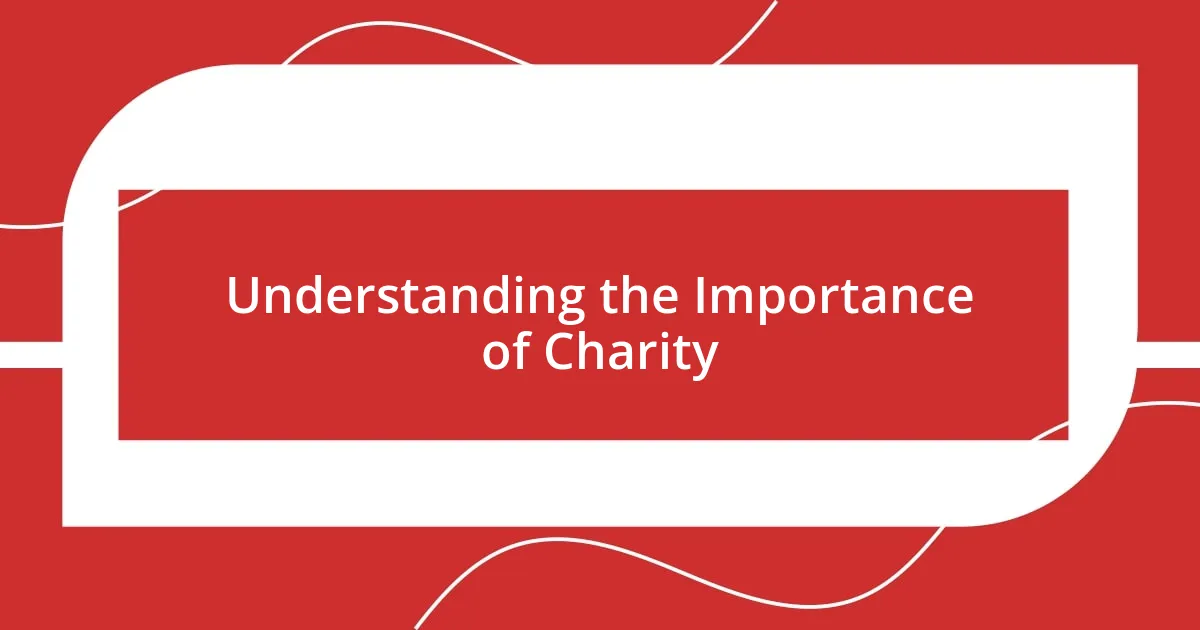
Understanding the Importance of Charity
Charity is more than just giving; it’s about connection and understanding the struggles of others. I remember volunteering at a local shelter, and it hit me hard when I listened to stories of resilience and hope from those experiencing homelessness. It made me realize how even small gestures can ignite a sense of belonging and lift spirits.
Engaging in charity work has a profound ripple effect on the community. I often think about the families I’ve met during fundraising events; their gratitude touched my heart. Isn’t it fascinating how one act of kindness can inspire others to give back? It creates a chain reaction of positivity and support that can transform lives.
Moreover, charity work often opens our eyes to societal issues we might overlook in our daily lives. Through my experiences, I have developed a deeper understanding of systemic challenges, whether it’s poverty, education, or healthcare disparities. Have you ever considered how your actions could contribute to meaningful change? I’ve learned that being part of a solution—no matter how small—can lead to both personal growth and communal advancement.
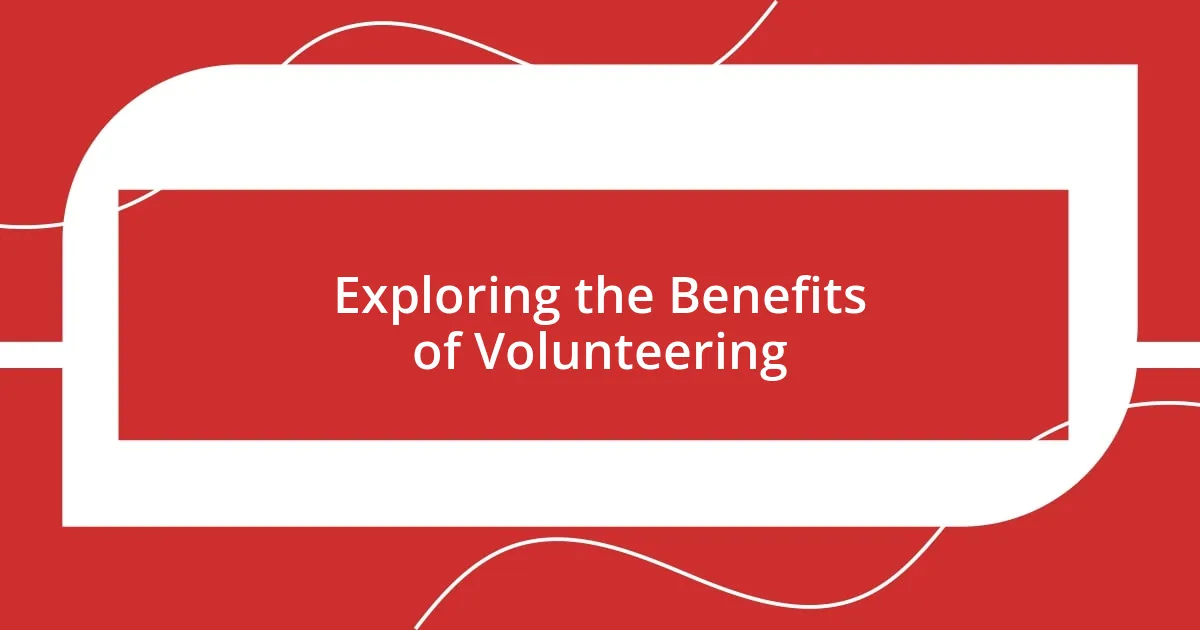
Exploring the Benefits of Volunteering
Volunteering offers a unique opportunity for personal growth. I recall my first experience at a community garden, where I joined a team of diverse individuals. As we tended to the plants, I connected with fellow volunteers over our shared laughter and sweat. That project didn’t just beautify the neighborhood; it became a space for friendships and collaboration, reminding me how beautiful it is to work towards a common goal.
Additionally, the skills gained through volunteering can be invaluable. I once supported a local literacy program, where I enhanced my communication abilities while helping adults improve their reading skills. It was a humbling experience that not only benefited those I helped but also equipped me with a sense of patience and adaptability. Have you ever found that unexpected skills often surface during volunteer work? It’s amazing how these experiences enrich our lives in ways we may not anticipate.
The emotional rewards of volunteering are equally significant. There’s something deeply satisfying about making a difference in someone’s life. I remember helping out at a food bank during the holidays; the grateful smiles of families receiving meals were worth every moment spent sorting cans. It created a profound sense of purpose in me, proving that, together, we can create a supportive environment that fosters love and unity.
| Benefit | Description |
|---|---|
| Personal Growth | Volunteering allows individuals to develop new skills and foster connections with diverse groups. |
| Skill Development | Opportunities to enhance communication, teamwork, and problem-solving skills often arise in volunteer settings. |
| Emotional Rewards | The satisfaction derived from helping others can lead to a deeper sense of purpose and community. |
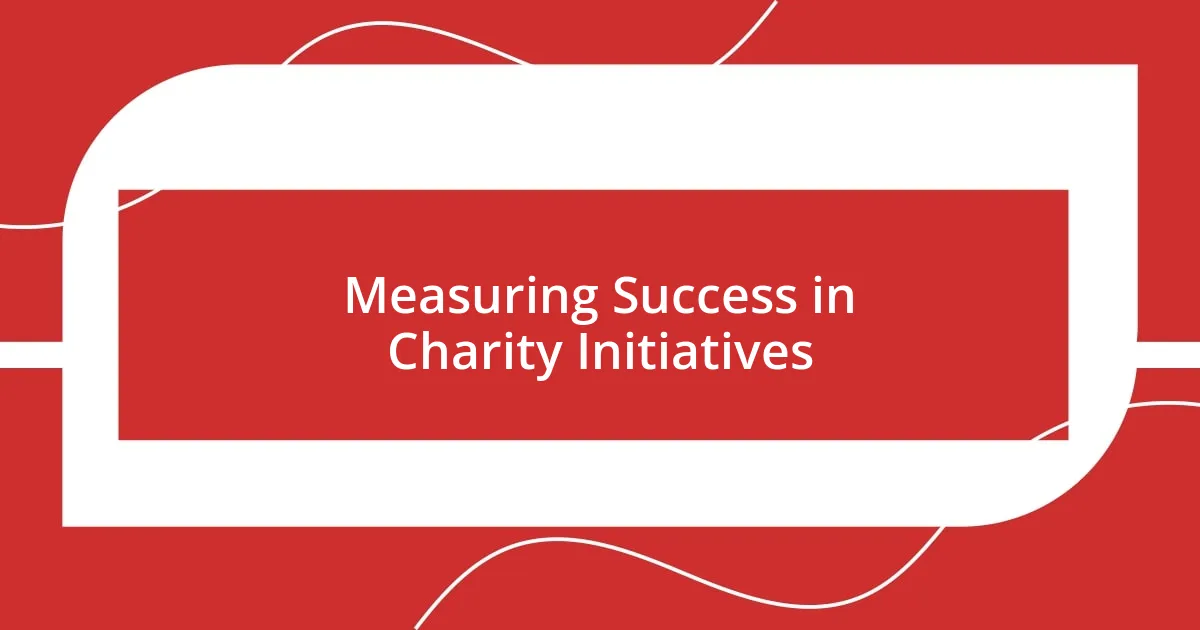
Measuring Success in Charity Initiatives
Measuring success in charity initiatives can sometimes feel elusive. I recall participating in a tree-planting event where our goal was to plant 1,000 trees in a day. At first, it seemed just about the number. However, reflecting on the bonds we forged as a group and the laughter we shared made me realize that success also measured through community engagement. It was about the connections we made and the legacy we left behind.
To evaluate the impact effectively, organizations often consider various metrics, blending quantitative and qualitative data. Here are some key aspects to consider:
- Goal Achievement: Assess the extent to which specific objectives were met, such as funds raised or trees planted.
- Community Involvement: Measure volunteer participation rates and community engagement during initiatives.
- Beneficiary Feedback: Collect stories and testimonials from those impacted, providing a personal touch to the statistics.
- Sustainability of Impact: Analyze whether initiatives create lasting changes, rather than just temporary solutions.
- Awareness Creation: Look at the increase in community awareness around the issues being addressed through charitable work.
These measures provide a fuller picture of success beyond mere numbers, reminding us of the profound human connections that charity fosters.
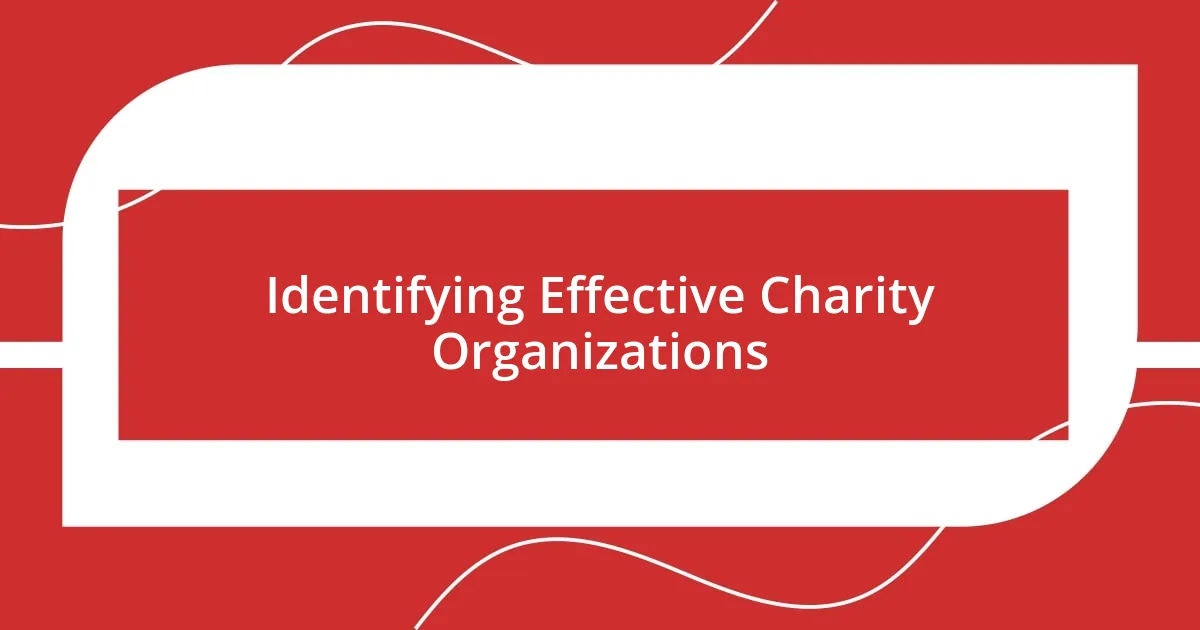
Identifying Effective Charity Organizations
Identifying effective charity organizations begins with understanding their mission and values. I remember researching a local nonprofit dedicated to youth mentorship—I was drawn to their commitment to empowerment and education. Their mission wasn’t just words on a website; it resonated with my values, reminding me how crucial it is for an organization to align its actions with its stated goals.
Another important step is to look for transparency and accountability. I once volunteered with a charity that openly shared its financial reports and detailed how funds were used. Honestly, I felt much more comfortable supporting them because it built trust. Have you ever thought about how transparency can influence your decisions? Knowing where your contributions go can make all the difference.
Lastly, examining the impact of an organization can reveal its effectiveness. After engaging with a charity focused on disaster relief, I was amazed to discover how they measured their success through tangible outcomes, like the number of families supported. It sparked a thought in me: Isn’t it inspiring when organizations can show the real changes they create in people’s lives? Recognizing this connection between effort and results often enhances your desire to contribute more.
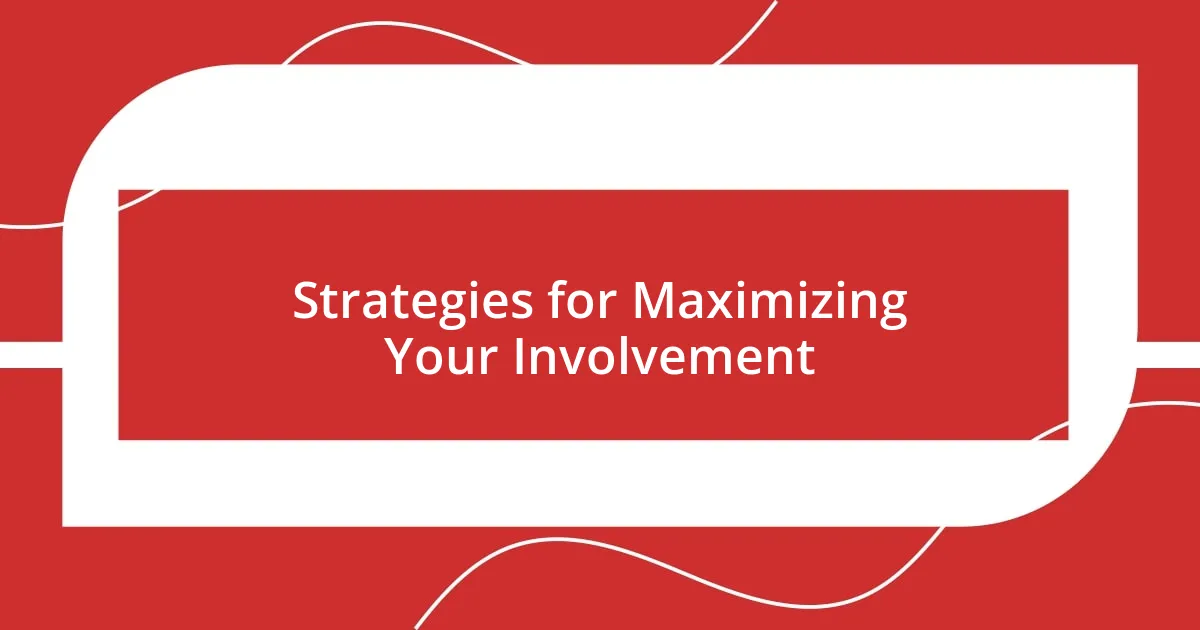
Strategies for Maximizing Your Involvement
To truly maximize your involvement in charity work, consider focusing on your strengths and passions. For instance, I found my niche in organizing community events, which allows me to utilize my planning skills while fostering collective enthusiasm. Have you thought about where you shine and how that can enhance your contribution? By aligning your skills with the charity’s needs, you create a more meaningful impact.
Collaboration amplifies your efforts significantly. When I teamed up with local businesses for a fundraising event, it doubled our reach and resources. It was amazing to witness the synergy created when people come together for a common cause. Have you thought about how partnering with others could elevate your initiatives? By pooling resources and ideas, the outcome can be far greater than working in isolation.
Regularly reflecting on your experiences can also deepen your commitment. After volunteering at a food bank for several months, I began journaling my thoughts and feelings about the work. This practice kept me inspired and focused on why I started in the first place. Have you taken the time to consider how your experiences shape your journey? By pausing to reflect, you can rediscover your motivations and reignite your passion for making a difference.
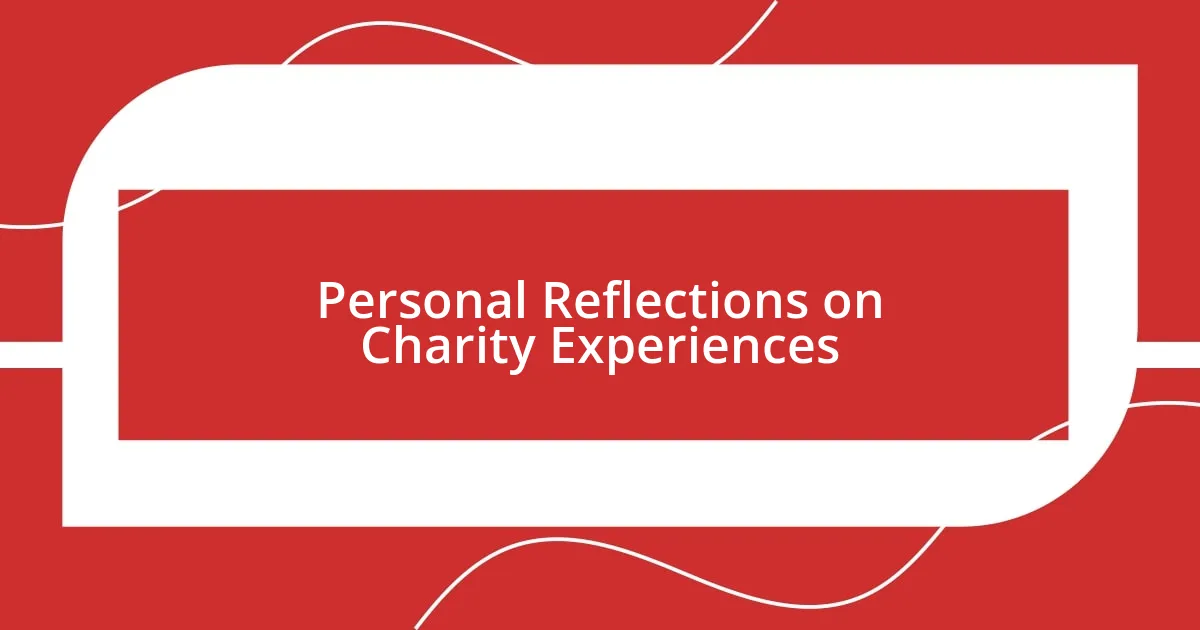
Personal Reflections on Charity Experiences
Reflecting on my charity experiences often brings a wave of emotions. I vividly recall volunteering at a local shelter during the holidays, where we served meals to those in need. The gratitude in the eyes of those we helped made such a profound impact on me—transforming what might have felt like just another day into a heartfelt reminder of our shared humanity. Have you ever felt that moment when you realize your efforts truly resonate with someone else’s life?
Another experience that stands out is when I participated in a community clean-up event. I remember chatting with a fellow volunteer who shared her story of growing up in that neighborhood, and how our work was helping beautify her childhood haven. It struck me then—how charity isn’t just about giving; it’s about connection and community. It makes me wonder: What stories are waiting to be uncovered in our charitable actions?
Taking a step back, I’ve also learned that charity work can be a mirror reflecting my own life choices. After spending time tutoring children from less fortunate backgrounds, I found myself reassessing my priorities and aspirations. Their innate curiosity and resilience inspired me to push through my own challenges. Have you ever realized that those you set out to help can end up teaching you invaluable lessons? The beauty of charity, in my experience, lies not just in the support we offer but in the growth we experience along the way.

